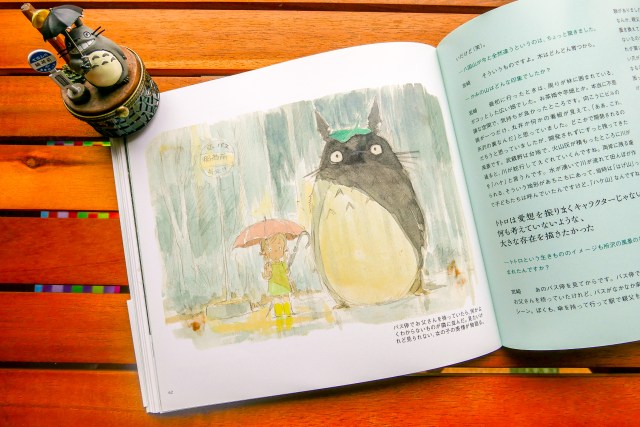
After working on My Neighbour Totoro, animator Akemi Miyazaki steps out from her husband’s shadow to show us Totoro’s real-world birthplace.
Studio Ghibli’s acclaimed director Hayao Miyazaki gets a lot of attention from fans around the world for his animated movies, but for every film he makes there’s a team of creatives there to help him achieve his vision, and one who’s been by his side the longest is his wife, Akemi Miyazaki.
What many people might not know is that Akemi is a talented animator, having met her husband when they were both working on the 1965 Japanese animated feature Gulliver’s Travels Beyond the Moon. After working on two of her husband’s Ghibli films, Nausicaä of the Valley of the Wind and My Neighbour Totoro, Akemi retired from the world of animation to raise the couple’s two sons, Goro and Keisuke, in a move that wasn’t entirely voluntary, as her husband has admitted himself that he wanted her to stay at home.
Now, in their later years, 77-year-old Miyazaki has been praising his 80-year-old wife for her creativity and knowledge, crediting her for prompting him to use the noborogiku groundsel flower in Boro the Caterpillar, and featuring her sketches in a new book produced by his animation studio.
▼ The new book is called “Totoro no Umareta Tokoro“, which translates to “The Place Where Totoro Was Born“.
Akemi is currently on the Board of Trustees for the Totoro no Furusato Foundation, which works to preserve the natural habitat and cultural assets of Sayama Hills in Saitama Prefecture, close to the city of Tokorozawa where she and her husband live. Sayama Hills, also known as Totoro’s Forest, is the fabled real-world birthplace of Totoro, where Miyazaki came up with the idea for the forest-dwelling character from My Neighbour Totoro, and this book showcases the area, with a focus on nature throughout the changing seasons.
More than 40 pages of the 80-page book are dedicated to Akemi’s sketches of nature in Totoro’s Forest, and her eye for detail is truly impressive. Her drawings illustrate the growth of plants like summer’s Ardisia japonica, commonly known as marlberry (above) and winter’s carpet of fallen leaves, with information about the trees they came from.
Also making an appearance on several pages is Ghibli producer Toshio Suzuki, who takes a stroll through Hachikokuyama, an area near Sayama Hills that inspired parts of My Neighbour Totoro. Camera in hand, Suzuki introduces us to some interesting sites in the area, including nearby Shin-yamanote Hospital, which served as the model for the hospital where Mei and Satsuki’s mother stayed in the film.
One of the most charming sections of the book, however, is the 20-page section featuring “image board” illustrations by Hayao Miyazaki, showing the initial development of the now-famous characters from the film.
▼ These pictures of Totoro, Mei and the Catbus were drawn in 1975, 13 years before the film was officially released in Japan.
The image board section comes with an interview with Miyazaki, who talks about the profound influence of the natural areas in and around Tokorozawa, which gave birth to Totoro and the cast of charming forest creatures that appear in the film.
The area had such an influence on him that he says, “If we didn’t live in Tokorozawa, Totoro would never have been born.”
We don’t want to imagine a world where Totoro doesn’t exist, and thanks to Tokorozawa and the Miyazakis, we don’t have to.
Totoro no Umareta Tokoro is currently available from the bookstore at the Ghibli Museum and other book retailers for 1,296 yen (US$11.48). Despite being written in Japanese, the photos and pictures make it enjoyable for everyone, including non-Japanese speaking Ghibli fans.
From 12 September, the book will be featured in a limited-time exhibition at the second-floor gallery space inside the Ghibli Museum, so visitors from around the world can get a taste of the beauty of the four seasons in the place where Totoro was born.
Photos © SoraNews24

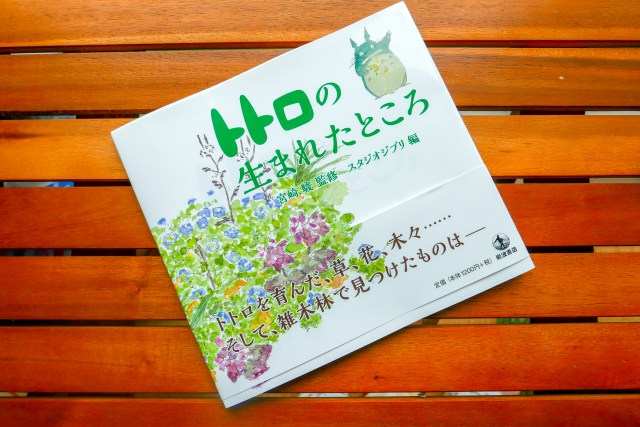
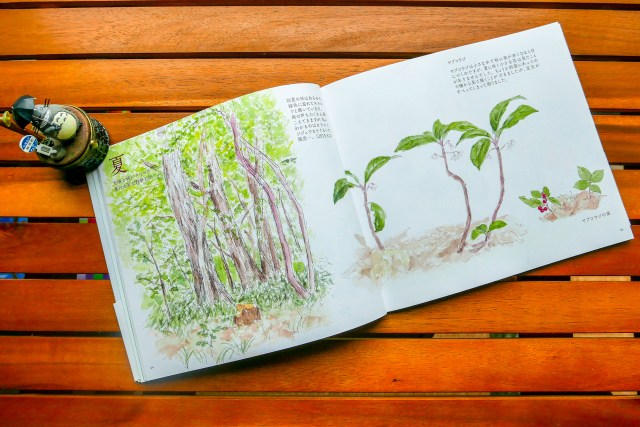
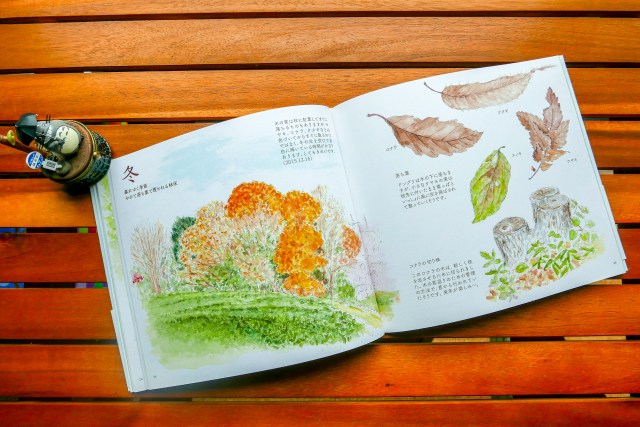
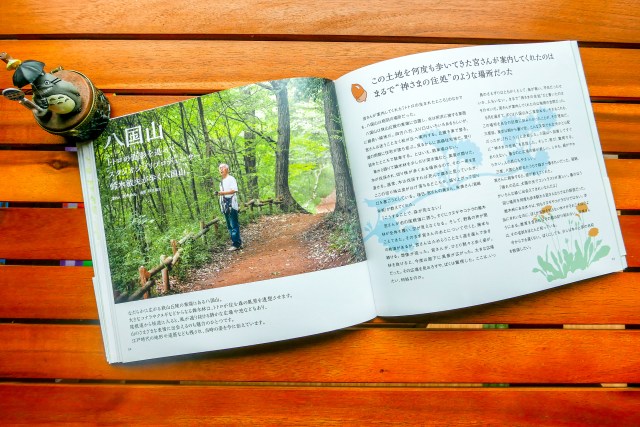
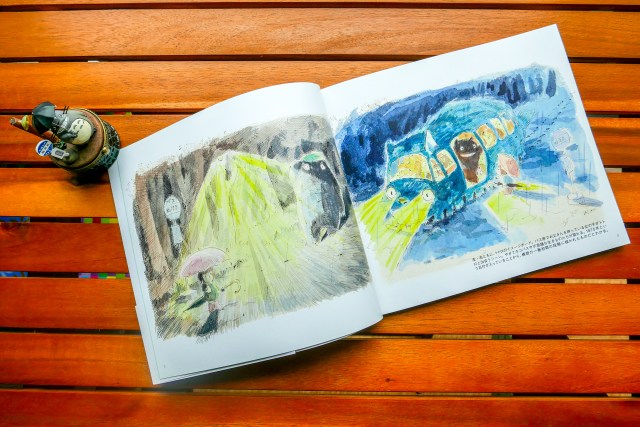
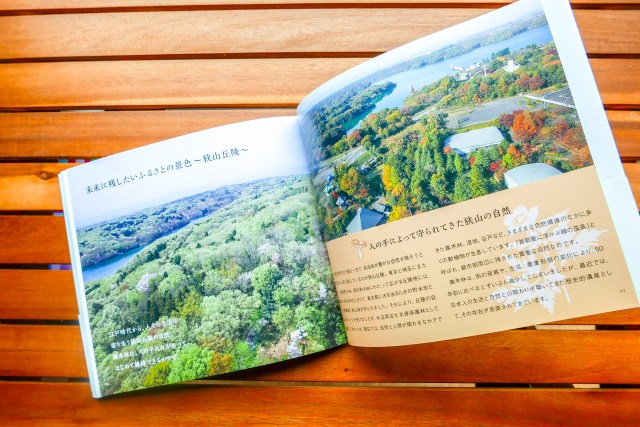


 Receive Studio Ghibli anime art in new crowdfunding campaign to save Totoro’s forest
Receive Studio Ghibli anime art in new crowdfunding campaign to save Totoro’s forest Studio Ghibli releases its first-ever train jingles, to be played at one special Japanese station
Studio Ghibli releases its first-ever train jingles, to be played at one special Japanese station How to get a job in anime with Studio Ghibli director Hayao Miyazaki
How to get a job in anime with Studio Ghibli director Hayao Miyazaki My Neighbour Totoro storyboards reveal secrets behind the Ghibli anime movie
My Neighbour Totoro storyboards reveal secrets behind the Ghibli anime movie Support Hayao Miyazaki’s Totoro Forest with new T-shirts and hoodies from Studio Ghibli
Support Hayao Miyazaki’s Totoro Forest with new T-shirts and hoodies from Studio Ghibli Foreign tourists in Japan will get free Shinkansen tickets to promote regional tourism
Foreign tourists in Japan will get free Shinkansen tickets to promote regional tourism Highest Starbucks in Japan set to open this spring in the Tokyo sky
Highest Starbucks in Japan set to open this spring in the Tokyo sky Japan Extreme Budget Travel! A trip from Tokyo to Izumo for just 30,000 yen [Part 1]
Japan Extreme Budget Travel! A trip from Tokyo to Izumo for just 30,000 yen [Part 1] Skyscraper sized Pokémon cards to appear in Tokyo all year long in Tocho projection mapping event
Skyscraper sized Pokémon cards to appear in Tokyo all year long in Tocho projection mapping event We take a cat yoga class at a Japanese rescue cat cafe
We take a cat yoga class at a Japanese rescue cat cafe Crane games in Japanese convenience stores getting more and more popular, especially with tourists
Crane games in Japanese convenience stores getting more and more popular, especially with tourists Japanese communities giving their skylines a spring clean and saying goodbye to power lines
Japanese communities giving their skylines a spring clean and saying goodbye to power lines A look inside the “Ghost Tower” of Bangkok, Thailand’s abandoned skyscraper
A look inside the “Ghost Tower” of Bangkok, Thailand’s abandoned skyscraper Ghibli’s Kiki’s Delivery Service returns to theaters with first-ever IMAX screenings and remaster
Ghibli’s Kiki’s Delivery Service returns to theaters with first-ever IMAX screenings and remaster Legendary pie cafe Anna Miller’s finally returns to Tokyo after three-year absence
Legendary pie cafe Anna Miller’s finally returns to Tokyo after three-year absence The 10 most annoying things foreign tourists do on Japanese trains, according to locals
The 10 most annoying things foreign tourists do on Japanese trains, according to locals Starbucks Japan releases new sakura goods and drinkware for cherry blossom season 2026
Starbucks Japan releases new sakura goods and drinkware for cherry blossom season 2026 Is Sapporio’s Snow Festival awesome enough to be worth visiting even if you hate the snow? [Pics]
Is Sapporio’s Snow Festival awesome enough to be worth visiting even if you hate the snow? [Pics] Japan has trams that say “sorry” while they ride around town…but why?
Japan has trams that say “sorry” while they ride around town…but why? Tokyo Skytree turns pink for the cherry blossom season
Tokyo Skytree turns pink for the cherry blossom season Japan’s new “Cunte” contact lenses aren’t pronounced like you’re probably thinking they are
Japan’s new “Cunte” contact lenses aren’t pronounced like you’re probably thinking they are Shibuya Station’s Hachiko Gate and Yamanote Line stairway locations change next month
Shibuya Station’s Hachiko Gate and Yamanote Line stairway locations change next month Yakuzen ramen restaurant in Tokyo is very different to a yakuza ramen restaurant
Yakuzen ramen restaurant in Tokyo is very different to a yakuza ramen restaurant Starbucks Japan adds new sakura Frappuccino and cherry blossom drinks to the menu
Starbucks Japan adds new sakura Frappuccino and cherry blossom drinks to the menu Japan’s newest Shinkansen has no seats…or passengers [Video]
Japan’s newest Shinkansen has no seats…or passengers [Video] Foreigners accounting for over 80 percent of off-course skiers needing rescue in Japan’s Hokkaido
Foreigners accounting for over 80 percent of off-course skiers needing rescue in Japan’s Hokkaido Super-salty pizza sends six kids to the hospital in Japan, linguistics blamed
Super-salty pizza sends six kids to the hospital in Japan, linguistics blamed Starbucks Japan unveils new sakura Frappuccino for cherry blossom season 2026
Starbucks Japan unveils new sakura Frappuccino for cherry blossom season 2026 Take a trip to Japan’s Dododo Land, the most irritating place on Earth
Take a trip to Japan’s Dododo Land, the most irritating place on Earth Naruto and Converse team up for new line of shinobi sneakers[Photos]
Naruto and Converse team up for new line of shinobi sneakers[Photos] Is China’s don’t-go-to-Japan warning affecting the lines at a popular Tokyo gyukatsu restaurant?
Is China’s don’t-go-to-Japan warning affecting the lines at a popular Tokyo gyukatsu restaurant? Survey asks foreign tourists what bothered them in Japan, more than half gave same answer
Survey asks foreign tourists what bothered them in Japan, more than half gave same answer Japan’s human washing machines will go on sale to general public, demos to be held in Tokyo
Japan’s human washing machines will go on sale to general public, demos to be held in Tokyo Starbucks Japan releases new drinkware and goods for Valentine’s Day
Starbucks Japan releases new drinkware and goods for Valentine’s Day We deeply regret going into this tunnel on our walk in the mountains of Japan
We deeply regret going into this tunnel on our walk in the mountains of Japan Studio Ghibli releases Kodama forest spirits from Princess Mononoke to light up your home
Studio Ghibli releases Kodama forest spirits from Princess Mononoke to light up your home Major Japanese hotel chain says reservations via overseas booking sites may not be valid
Major Japanese hotel chain says reservations via overseas booking sites may not be valid Put sesame oil in your coffee? Japanese maker says it’s the best way to start your day【Taste test】
Put sesame oil in your coffee? Japanese maker says it’s the best way to start your day【Taste test】 No more using real katana for tourism activities, Japan’s National Police Agency says
No more using real katana for tourism activities, Japan’s National Police Agency says Winter walking event takes you around Totoro forest loved by Hayao Miyazaki
Winter walking event takes you around Totoro forest loved by Hayao Miyazaki Support Hayao Miyazaki’s real-world Totoro forest with hoodies featuring exclusive anime art
Support Hayao Miyazaki’s real-world Totoro forest with hoodies featuring exclusive anime art Studio Ghibli reveals surprising secrets hidden in My Neighbour Totoro
Studio Ghibli reveals surprising secrets hidden in My Neighbour Totoro Studio Ghibli’s Totoro and the Catbus forever preserved together in new statue 【Pics & Video】
Studio Ghibli’s Totoro and the Catbus forever preserved together in new statue 【Pics & Video】 Real-world forest that inspired Hayao Miyazaki to create Totoro will become a nature preserve
Real-world forest that inspired Hayao Miyazaki to create Totoro will become a nature preserve Spring walking event provides guided tour around Totoro forest loved by Hayao Miyazaki
Spring walking event provides guided tour around Totoro forest loved by Hayao Miyazaki Every piece of Hayao Miyazaki’s Ghibli anime concept art to be published in new book series
Every piece of Hayao Miyazaki’s Ghibli anime concept art to be published in new book series Book of over 200 Hayao Miyazaki Totoro pre-production illustrations, some never published, now on sale
Book of over 200 Hayao Miyazaki Totoro pre-production illustrations, some never published, now on sale My Neighbour Totoro train jingles now playing at Tokorozawa Station【Videos】
My Neighbour Totoro train jingles now playing at Tokorozawa Station【Videos】 New Studio Ghibli tea collection includes tea sourced from Totoro’s real-life forest in Japan!
New Studio Ghibli tea collection includes tea sourced from Totoro’s real-life forest in Japan! Keeping Totoro’s Forest safe: Anime legend Hayao Miyazaki volunteers in conservation event
Keeping Totoro’s Forest safe: Anime legend Hayao Miyazaki volunteers in conservation event Studio Ghibli releases a Totoro wind chime with a century of craftsmanship behind it
Studio Ghibli releases a Totoro wind chime with a century of craftsmanship behind it Studio Ghibli producer dishes the dirt on Hayao Miyazaki, Your Name, and their next big project
Studio Ghibli producer dishes the dirt on Hayao Miyazaki, Your Name, and their next big project How to play Totoro’s mysterious flute from My Neighbour Totoro【Pics & Video】
How to play Totoro’s mysterious flute from My Neighbour Totoro【Pics & Video】 Totoro discovered in Japanese forest【Photos】
Totoro discovered in Japanese forest【Photos】